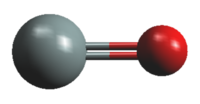|
The fit and the data set have been described
in
(1) H. S. P. Müller, S. Spezzano, L. Bizzocchi, C. A.
Gottlieb, C. Degli Esposti, and M. C. McCarthy,
2013, J. Phys. Chem. A 117, 13843.
Additional rotational data were taken from
(2) M. E. Sanz, M. C. McCarthy, and P. Thaddeus,
2003, J. Chem. Phys., 119, 11715;
from
(3) R. Mollaaghababa, C. A. Gottlieb, J. M. Vrtililek,
and P. Thaddeus,
1991, Astrophys. J. 368, L19;
and from
(4) S.-H. Cho and S. Saito,
1998, Astrophys. J. 496, L51.
Infrared transitions were also used in the fit. These
were reported by
(5) F. J. Lovas, A. G. Maki, and W. B. Olson,
1981, J. Mol. Spectrosc. 87, 449;
and by
(6) J. M. Campbell, D. Klapstein, M. Dulick, P. F. Bernath,
and L. Wallace,
1995, Astrophys. J. Suppl. Ser. 101, 237.
Predictions with uncertainties larger than 300 kHz
should be viewed with some caution.
The 17O hyperfine splitting may be resolvable
in astronomical observations. The splitting changes
with v. Therefore, a
separate hfs calculation is provided for J" up
to 3 and v up to 2 together with appropriate
partition function values.
The partition function is fully converged up to 500 K;
some extrapolation is possible.
The equilibrium dipole moment and its first order vibrational
correction was taken from
(7) J. W. Raymonda, J. S. Muenter, and W. A. Klemperer,
1970, J. Chem. Phys. 52, 3458.
The latter value was scaled with the ratio of the
appropriate power of the reduced mass, as was done for the
first order rotational correction (6.0 μD)
derived from Einstein A values of the main isotopolog
reported in
(8) E. J. Barton, S. N. Yurchenko, and J. Tennyson,
2013, Mon. Not. R. Astron. Soc. 434, 1496;
see documentation file for the main isotopolog, e044505.cat.
|
